by Mike Plambeck
Have you heard of the HUD Good Neighbor Next Door program? People who qualify are extremely excited about the potential savings that this program represents for their families. With discounts as high as fifty percent on eligible properties, you might just be able to score the house of your dreams. The government values all of the professions and wishes professionals to own houses and have a workspace nearby.
Homebuyers who are ready to save money on their next house should have a thorough understanding of HUD and the programs it offers to see if they could benefit from these savings.
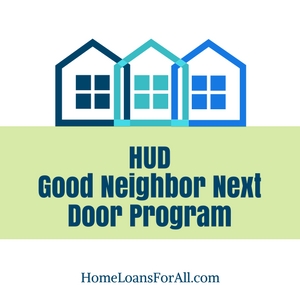
HUD stands for the Department of Housing and Development, a branch of the federal government. They come into possession of many single-family residences and properties as a result of their connection with the Federal Housing Administration (FHA) mortgage program.
The government agrees to back these loans for private lenders. This makes homeownership more accessible to the general population. However, the federal government often comes into possession of these properties if and when they move into foreclosure.
HUD attempts to sell the properties through their HUD Homestore in order to recoup the losses they incurred on these foreclosed houses.
Anyone can purchase these homes, as long as you have the cash or the financing available to cover their cost.
However, they also offer some extremely advantageous programs to make these properties even more affordable.
Pre Qualify for the Neighbor Next Door Program Here.
What is the Good Neighbor Next Door Program?
The Good Neighbor Next Door Program offers single-family properties in revitalization areas to individuals of certain professions at a fifty percent discount. In exchange for this steep discount, the owner must agree to live in the property for a full three years.
During this time, the government will hold a second mortgage on the property for the other half of the home’s cost. This is often referred to as a “silent mortgage”. When you have completed your residency requirements, the second mortgage is dropped and you officially own your home.
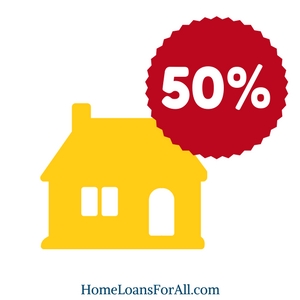
Who is Eligible?
Only people who are employed within a narrow sector of the workforce can qualify for the Good Neighbor Next Door Program. Eligible individuals include:
- Law enforcement officers
- Pre-kindergarten through twelfth-grade teachers
- Firefighters
- Emergency medical technicians
Within this set of parameters, you must be employed full-time by a federal, state, county, parish, municipality, Indian tribal government, division of a local government, or a state-accredited private or public school. The property you select must be eligible and it must be located within the areas serviced by your employer.
In order to be eligible for the Good Neighbor Next Door program, you or your spouse cannot have owned a home within the past year or currently own a home. You may only purchase one home through this program or through the previous program known as Officer/Teacher Next Door.
What kind of properties are eligible?
The Good Neighbor Next Door program allows eligible individuals to purchase specific single-family properties in revitalization areas. These areas are determined by Congress under the National Housing Act in order to offer more homeownership opportunities.
The location may qualify for this status due to household income, homeownership rates, and FHA-insured mortgage foreclosure rates.
How do I apply?
The best thing you can do is to go ahead and provide some of your information to be matched with eligible properties. You can sign up to receive alerts and to be connected to a real estate professional on the HUD Good Neighbor Next Door website here.
Submitting your information also allows them to help determine your eligibility prior to becoming involved with bidding on the available properties.
If you believe that you may still eligible for a HUD Home even after receiving a denial, there are asset managers available to help review your unique case and application.
Where do I find the Good Neighbor Next Door listings?
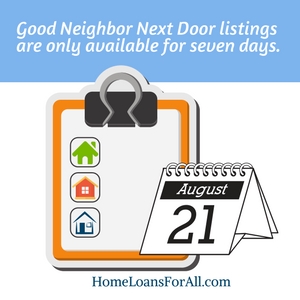
You can find the listings on the HUD Homestore website that lists all available properties that have had FHA foreclosures. On their homepage, you will see a drop-down box labeled “Buyer Type.”
This has a specific option for Good Neighbor Next Door buyers. It allows you to see if there are currently any eligible properties listed in your desired area.
Keep in mind that these Good Neighbor Next Door listings are only available for seven days. At the end of seven days, lottery-style drawing decides one random bid.
You will need to start talking with a lender now in order to become prequalified for financing. This is a requirement in order to submit bids because you will have to prepare for the pending closing.
You will need to submit an earnest money deposit that is equal to one percent of the list price (minimum of $500 and a maximum of $2,000). HUD estimates that the out of pocket cost for closing and utility activations could equal anywhere from $1,110 to $3,460 upfront.
The entire process usually takes 45 to 75 days to reach closing.
Take a look at our 203k FHA Loan article and find out how you can use this type of financing to fix up a HUD property!
Conclusion
Purchasing a home through the Good Neighbor Next Door Program is a great way to save thousands of dollars. Unfortunately, it is only available for an extremely small section of the population. Be sure to investigate whether your employment would qualify you for this program. Then, you can start hunting for the perfect Good Neighbor Next Door listings today.
Frequently Asked Questions
Do correctional officers qualify for the Good Neighbor Next Door Program?
Correctional officers may qualify for the Good Neighbor Next Door Program.
Is there a Good Neighbor Next Door Program for substitute teachers?
Substitute teachers who are employed full-time and have an ongoing contract with a state-accredited public school or private school may qualify for the Good Neighbor Next Door program.
What are HUD revitalization areas?
These are geographic areas authorized by Congress as a part of the National Housing Act. They qualify based on the household income, homeownership rate, and the FHA-mortgage foreclosure activity in an area.
Where can I view Good Neighbor Next Door listings?
You can view Good Neighbor Next Door listings through the HUD Homestore website. You will simply need to filter the results to view eligible properties.
by Mike Plambeck
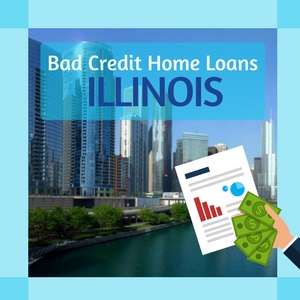 Everyone dreams of owning a home, but if you have bad credit, that dream can sometimes feel like a nightmare. It’s easy to get discouraged, but you shouldn’t, because there are plenty of ways to get a home loan in Illinois even with bad credit.
Everyone dreams of owning a home, but if you have bad credit, that dream can sometimes feel like a nightmare. It’s easy to get discouraged, but you shouldn’t, because there are plenty of ways to get a home loan in Illinois even with bad credit.
The first thing you need to understand to get a loan with bad credit is what a lender looks for when they approve a loan. The first and most important consideration is your FICO credit score. It is an approximate measure of how good you are at paying back your debts and loans.
If you have excessive debts or miss payments, you’ll have a low credit score, but if you’re consistently paying your bills and don’t use all of your credit lines you’ll have a higher score.
Get Pre Qualified for An Illinois Low Credit Home Loan Today.
The second essential consideration that determines whether or not you get a loan is your debt-to-income ratio. This number is a measure of how much money to owe to various organizations compared to how much money you make from your job or jobs.
Most lenders like to see your debt take up no more than forty percent of your gross income.
What do you do if you have bad credit and are looking for a house in Illinois? There’s plenty of options, and in this article, we’ll tell you all about them.
How To Buy A House In Illinois With Bad Credit
If your credit score drops below 550 it can be difficult to secure a home loan in Illinois. Rebuilding your credit is always a possibility, but it can also be time-consuming, and sometimes you need a place to live right now.
Fortunately, there are several options available which we will discuss in this article for securing a place to live with bad credit. We will cover rent-to-own housing, finding a co-signer, or seeking out one of the government programs that help people with bad credit find a place to live.
Government Programs for Bad Credit in Illinois
IHDA 1stHomeIllinois Loan
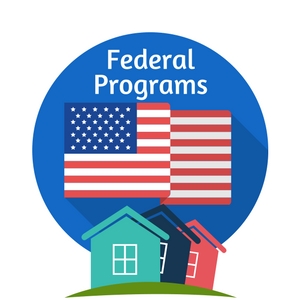 The Illinois Housing Development Authority is a self-supporting state agency whose board members are appointed by the Governor. It finances affordable housing throughout the state of Illinois in order to help low and moderate-income people afford mortgages.
The Illinois Housing Development Authority is a self-supporting state agency whose board members are appointed by the Governor. It finances affordable housing throughout the state of Illinois in order to help low and moderate-income people afford mortgages.
Most of their loans require a credit score of 640 in exchange for much lower or deferred down payments.
However, the 1stHomeIllinois home loan program is specifically designed for first-time homebuyers, veterans, or anyone who hasn’t owned a home in the last three years.
This type of loan combines a 30-year fixed-rate mortgage with a $7,500 down payment assistance grant and has much more lenient credit requirements.
Unfortunately, this program is only available in Boone, Cook, DeKalb, Fulton, Kane, Marion, McHenry, St. Clair, Will, or Winnebago counties. Lucky you to live in those places!
Federal Programs
In addition to the assistance programs put in place by the IHDA, the federal government has tools in place that help mortgage seekers acquire home loans in Illinois with bad credit.
FHA Loans
FHA loans can be found at most private money lenders or banks and are the most popular type of mortgage in the country.
These types of loans are insured by the Federal Housing Administration, an agency of the United States government. They promise to pay back the lender if you are unable to make your payments. And they are interested in your housing. Happy housed families boost the economy!
Because their investment is insured, lenders have much lower requirements for FHA loans than they do for conventional mortgages, including lower credit requirements, which makes them ideal
Illinois loans for bad credit.
VA Loans
If you are a service member or veteran, you might be eligible for a VA loan. VA is a federal program that waives the private mortgage insurance and an initial down payment on a home loan, which will likely save you thousands of dollars on the full price of the home.
VA loans also have the benefit of not having a minimum credit score requirement, which makes them a good way to get a home loan with bad credit.
Rent To Own Options in Illinois
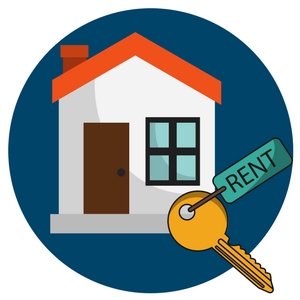 If you’re not ready or unable to secure a home at this time, either. Maybe, your credit is too bad or because you’re otherwise ineligible for any of the programs above, you might consider a rent-to-own situation.
If you’re not ready or unable to secure a home at this time, either. Maybe, your credit is too bad or because you’re otherwise ineligible for any of the programs above, you might consider a rent-to-own situation.
In a rent-to-own contract, a portion of your monthly rent payment is put towards the principal of the home. So, you will have a place to live while you take the time to save up for the full purchase and/or repair your credit.
Once the lease is up, you will be given the option to purchase the home outright. This will require securing another home loan from another moneylender, but this is Cosigner on a Home Loan
Cosigner
If you have a friend or a family member with good credit who’s willing to help you out, they can become a cosigner on your home loan.
This allows you to apply for a loan as though your credit score was the same as the cosigner’s, which gives you better terms and a better chance of getting accepted.
However, it also means that your cosigner takes on all the risk of you defaulting on the loan, so make sure you both understand the conditions of the deal before signing.
First Time Buyers In Illinois With Bad Credit
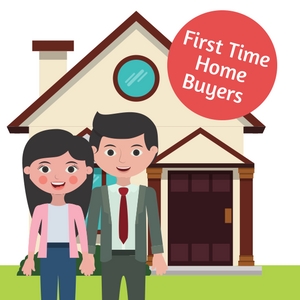 First-time homebuyers in Illinois usually prefer either the IHDA 1stHomeIllinois loan option or the FHA loan. Both can and will help you secure your first loan even if you have bad credit. If your credit is 580, your down payment on an FHA loan will only be 3.5 % in most cases.
First-time homebuyers in Illinois usually prefer either the IHDA 1stHomeIllinois loan option or the FHA loan. Both can and will help you secure your first loan even if you have bad credit. If your credit is 580, your down payment on an FHA loan will only be 3.5 % in most cases.
If your credit is lower than that (usually there’s a minimum cutoff of 500), the down payment will be slightly higher, but still lower than that of a conventional loan.
You may also be able to make up for even worse credit with alternative forms of credit, like proof that you regularly pay your utility or phone bills.
Bad Credit Home Loans In Illinois After Bankruptcy
When your house is foreclosed upon or you file for bankruptcy, it can cause major damage to your credit score and can greatly impact your ability to get a second home loan in the future. But bankruptcy doesn’t have to be the end.
Conventional mortgages usually require a seven-year waiting period after filing for bankruptcy before you can apply for a new loan. FHA mortgages only have a three-year waiting period and VA home loans only require two.
Best of all, if you take time to rebuild your credit during the waiting years, you will get even better terms on your loan once the waiting period has ended.
Assistance Available In Illinois
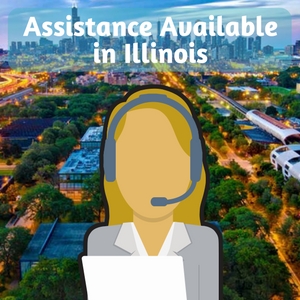 There are many different kinds of assistance available to the prospective home buyer with bad credit in Illinois.
There are many different kinds of assistance available to the prospective home buyer with bad credit in Illinois.
The Department of Housing Preservation and Development and HUD-approved counseling are good places to get answers and to find advice on securing a home loan. Another useful resource that can help you make payments on a potential property is the
Homestead Tax Credit
A Homestead tax exemption lets you withhold a certain amount of money (sometimes a dollar amount, sometimes a percentage of the house’s total value) from your property taxes if you live in a home that you are paying off. People who are eligible for the homestead tax credit in Illinois will save up to $7000 in Cook County and up to $6,000 in all other counties.
How To Improve Your Credit Score
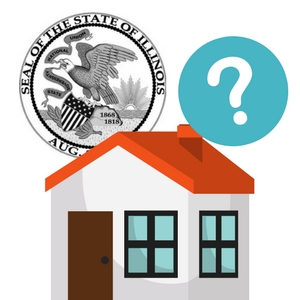 Fixing your credit score takes a lot of time and effort, especially if you’ve had to foreclose on a house or file for bankruptcy in the past. The first thing you have to do to fix your score is to pay every bill on time every month. It sounds terrifying but there is nothing supernatural in that. You can do this!
Fixing your credit score takes a lot of time and effort, especially if you’ve had to foreclose on a house or file for bankruptcy in the past. The first thing you have to do to fix your score is to pay every bill on time every month. It sounds terrifying but there is nothing supernatural in that. You can do this!
This shows potential lenders that you have a good grasp of your finances and that you are a safe, reliable investment who will allow them to make their money back.
The second thing you have to do is to start paying off some of your existing debts. This has two important effects.
- Firstly, it improves your credit score.
- Secondly, it improves your debt-to-income ratio, which is the other major thing that lenders look at when deciding whether or not to approve a loan application.
Above all, make sure that your credit repair efforts are consistent. Do what you can to pay your bills and debts every month. And use an app to keep track of your credit score to see how well the improvements are working.
Conclusion
We named our site “Home Loans For All” because we truly believe that everyone deserves to live in a house of their own. We truly believe that this is something everyone can achieve.
Be consistent with improving your credit score and take advantage of some of the programs we’ve described above, and you’ll be able to secure a loan no matter what your credit currently looks like. Trust us – the home of your dreams is about to become a reality.
Additional Resources
by Mike Plambeck
Finding an FHA loan with around a 500 credit score is a challenge!
In this article, we’ll show you how you can utilize your credit score even around the 500 level to get the loan you want. Let us help you get prequalified.
You’re going to learn:
-
- What is the minimum FHA credit Score requirement?
- How Lenient is the FHA with down payments?
- How Investor Overlays affect your credit score requirements
You probably already know the minimum FHA credit score to receive a home loan is technically 500. You probably don’t know that it is also possible to receive a mortgage loan without having a credit score.
When you get an FHA loan, there’s no credit score required. Whereas other conventional loans, VA loans, and USDA loans have a minimum credit score requirement of 620. Of course, there can be some exceptions if someone has a legitimate reason; it all depends on the situation.
What is the Minimum FHA Credit Score Required?

If you are looking to receive an FHA home loan, lucky you, it is much easier this year. You may have been unable to receive a loan because your credit score fell just below a certain limit. However, major lenders will now be approving borrowers if they have FICO scores of at least 580.
This is 60 points lower than the minimum home loan credit scores of 2014. FHA lenders would require FICO scores of at least 640. This announcement is just in time, too. FHA home loans are in demand right now! FHA also has a very lenient down payment minimum of 3.5%, which is much better than many other backed-loans. And it hasn’t been changing for quite some time now. So, stability is all about FHA.
In addition, they are much more forgiving and able to work with you versus other mortgage loans.
With this drop in minimum FHA credit scores required, you will be able to get the loan you need. Even if you might have been under the minimum home loan credit score requirement in the past, this shouldn’t stop you.
The economy has been steadily declining so it is time we got a break and FHA listened. This is just the break homeowner’s need! Whether you are looking to get a loan for your very first home or you’re in need of a home loan for your next home, you’ll be able to get it without worrying so much about the minimum FHA credit score.
The article continues below the form.
We Can Help You Get Qualified Even With Low Credit
Fill Out The Form Below To Get Help Today!
FHA Lenient Down Payment Policy
Home loans are at the core of the housing market. Without them, people would be unable to get enough money together to be able to start paying on their new homes or get a big chunk paid off to be able to afford living there. So, it can be difficult to pay off your home and the loan at the same time. With FHA’s loans, you’ll only be paying a 3.5% down payment. This allows you to pay off a bit at a time so you won’t be running your bank account into the ground while trying to get back on your feet!
With the announcement of the 60 point minimum FHA credit score drop, it’s easy to see how much FHA is willing to work with people! FHA guidelines say that if you are looking to buy a home, you must be able to make at least a 3.5% down payment on the home’s price. Thus, they can be sure you are going to follow through with the purchase. FHA loan limits can range from $271,200 for a one-family house to $1,202,925 for a 4-unit home; that’s quite a big range.
More Approvals Will Be Seen Because of Less FHA Investor Overlays
The FHA mortgage guidelines tell which loans lenders will and will not issue. Though, lenders in the US don’t underwrite loans exactly how the FHA guidelines say they should. Lenders can make their own restrictions through investor overlays. These overlays can make it much more difficult for someone looking for a loan to get approved.
One important overlay has a lot to do with credit scores for home loans. The guidelines say that they will insure home loans for any person with a credit score of at least 500. The banks are not as willing to follow through with what the FHA thinks. The banks see people with a credit score of 500 as liabilities. Most people with a credit score of 500 are likely to default in the next six months, which will damage a bank’s FHA default rate.
So back in 2011, most banks started requiring minimum home loan credit scores of 640. It has been lowered since then, but it is not where it should be yet. However, it is getting there! The 60 point drop brought it down to 580! The domestic economy has started to improve while the US housing industry is expanding. So, we might even see a minimum FHA credit score drop down again pretty soon!
FHA has been the best choice for most homebuyers in America because of how flexible and willing to cooperate they are. It looks like they are still working hard to keep that reputation among other banks sticking to their rigid ways. This drop in the minimum FHA credit score requirements could be just what a new home buyer needs to purchase their very first home. The FHA loan requirements 2020 should be taken advantage of by all those looking to buy a new home.
FHA Minimum Credit Score Requirements FAQ

Ask away!
What is The Minimum Credit Score For an FHA Loan?
The absolute minimum is 500, but to get the best rates borrowers should look to have at least 580+. Those under the 580 mark will need to come with an additional down payment of up to 10% of the loan in order to offset the increased risk for the lender, while those at 580 will only need 3.5%.
Does Having an Acceptable Credit Mean I’m Automatically Approved?
No, there is still a range of other factors that go into approving any type of loan including the FHA back ones. For example, an individual with good credit might have too low of an income to be approved for a larger loan.
There are also lender specific requirements, so while a low credit score might be fine for some others might not approve it.
Who Approves FHA Loans?
FHA loans are provided and approved by specific 3rd party lenders. Each lender has their own set of requirements, so the ability to secure a loan can change from lender to lender.
Can I Qualify For an FHA Loan With No Credit?
Yes, FHA loan lenders cannot deny someone solely on the basis that they have no credit history. In cases like this, lenders will look to non-traditional credit sources likes utility payments to ensure that the potential borrower has an on-time payment record of at least a year on them.
Additional Resources for Minimum FHA Credit Score Requirements
FHA Loans Illinois
FHA Loan in Oregon
FHA Loans in New York
by Mike Plambeck
 Veterans and service members who are looking to purchase a home in 2018 will be excited to learn about all of the great VA loan benefits.
Veterans and service members who are looking to purchase a home in 2018 will be excited to learn about all of the great VA loan benefits.
This government program offers a wide array of advantageous features that could make home ownership a more likely possibility for your military family.
Before you even start the process of searching for a home, you should know all of the VA loan benefits that you can expect.
The largest benefit of applying for a VA loan is that buyers no longer need to scrape together their savings to cover the down payment. This payment, along with your private mortgage insurance (PMI), is waived altogether.
Saving money on these two perks is significant, but those aren’t the only advantages of a VA loan. You’ll find out some of the other inherent benefits of this loan program in the sections below.
We Are VA Loan Specialists, Pre Qualify for a VA Home Loan Today, Click Here.
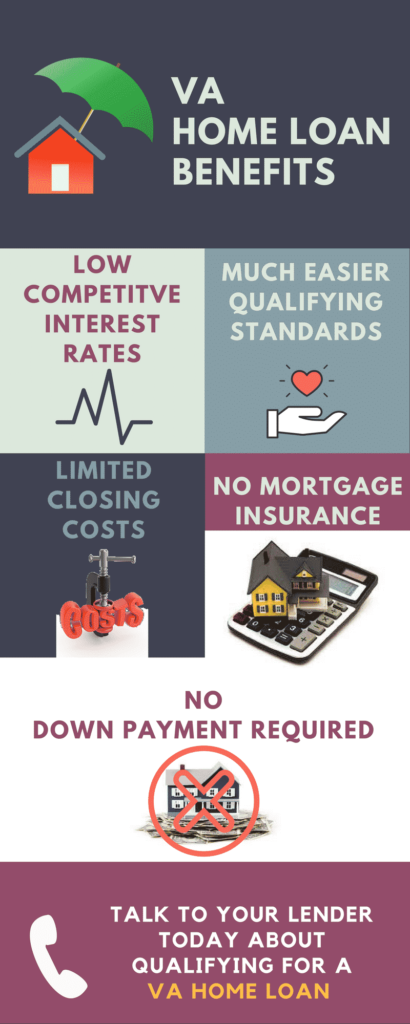
VA Loan Benefits = Saving More Money
When it comes to deciding on a mortgage program, you want to ensure that you select something that offers many perks for you as a homeowner.
These benefits can help eligible veterans save thousands of dollars over the duration of your loan. With the advantages of a VA loan, you can keep more money in your pocket with some of these key perks.
Did you know that the VA also offers Small Business Loans for veterans? Learn more about programs available to veterans for small business loans here.
There’s No Better VA Loan Benefits Than No Down Payment
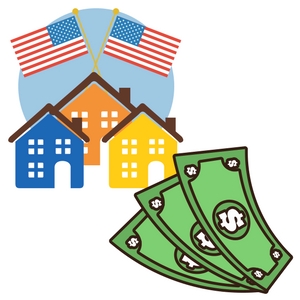 This perk is one of the most heavily advertised features of a VA loan program. Lenders are able to waive the typical down payment on a home due to the backing of the federal government.
This perk is one of the most heavily advertised features of a VA loan program. Lenders are able to waive the typical down payment on a home due to the backing of the federal government.
In a conventional mortgage, home buyers are required to put down a twenty percent down payment to give the lender some security for the loan in the event that you would default on the payments.
The security of the down payment is unnecessary because the Department of Veterans Affairs is willing to cover a portion of the loan. This is mutually beneficial for both you as the buyer and for the lender.
The lender can have peace of mind and financial security for issuing the financing, while you can avoid the need to save up for years in order to make the necessary down payment.
Consider that the cost of the average home for sale in the United States is approximately $200,000.
This means that a down payment on this home would typically come to $40,000.
Most homeowners don’t have that kind of money tucked away in a savings account which ultimately delays their ability to purchase a home. With the VA loan benefits, you won’t have to worry about scraping out your savings account for this upfront sum.
VA Loan Advantage of No Monthly Mortgage Insurance
On a conventional mortgage, homeowners who put down less than the requisite twenty percent down payment are usually forced to pay private mortgage insurance (also abbreviated as PMI).
The security granted by the federal government’s backing allows lenders to drop this unnecessary fee as well.
Homeowners may not truly understand how much money this can save them at a quick glance. However, you should be aware of how quickly these payments can add up over the years.
The average PMI payment ranges from 0.3 percent to 1.5 percent of the principal balance on the mortgage. On the home from our previous example, this means you could be paying up to $3,000 annually on this insurance policy.
Unlike other federal programs, such as the FHA mortgage, one of the main advantages of the VA loan is the ability to skip over this cost and lower your monthly expenditures.
Lower Interest Rates
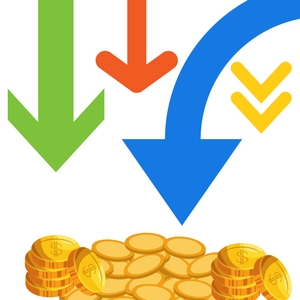 Finding the exact interest rates for a VA loan can be difficult. It should be noted that the government doesn’t actually set specific interest rates for this program.
Finding the exact interest rates for a VA loan can be difficult. It should be noted that the government doesn’t actually set specific interest rates for this program.
They leave up to the private lenders who ultimately issue the financing to set specific interest rates. In this situation, you may find that your interest rate is heavily influenced by your credit score, down payment amount, economic indicators, debt-to-income ratio, and more.
The good news is that the interest rates are typically much lower on a VA loan than they would be on conventional products. Lenders often use high interest rates as a way to gain some security for themselves in the event that a homeowner misses payments.
This is why applicants with low credit scores tend to receive higher interest rates. It’s the lender’s way of justifying the risk they will be taking on your credit profile.
However, a VA loan allows the lender to rest in the security of the government’s backing and offer lower interest rates to all customers.
You’ll have to check around with several lenders to ensure that you receive the best possible rate, but they are almost all guaranteed to be lower than conventional mortgage rates.
Lower Credit Requirements
Have you struggled with making payments on time in the past? Poor credit can be the result of several missed payments, high credit utilization, or a short credit history.
A lower score may mean that you won’t qualify for conventional mortgages or even some of the other government programs.
For example, an FHA loan requires a credit score of 580 or higher in order to pass on the most benefit.
In comparison, one of the major VA loan benefits is the lower credit requirements. Because the lenders know the loan is secure due to the federal backing, they are more willing to consider buyers who have a spotty credit history.
There are no minimum credit score requirements in order to be eligible for this loan program.
Lenders are encouraged to take a detailed look at the entire profile before making a decision on who is eligible for a loan.
Closing Cost Concessions
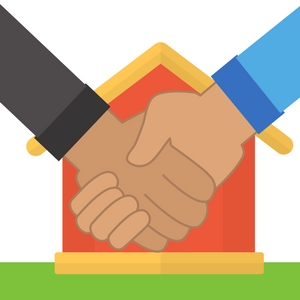
Sometimes, a veteran may be financially prepared for the purchase of a home but the closing costs can really add up. Most experts will estimate that the closing costs for any home add up to equal roughly three to five percent of the home’s cost.
Depending on the market value of your home, this could mean thousands of dollars are due at the time of closing.
There could be another solution for homebuyers who know all of the VA loan benefits though. Because of the closing cost concessions possible with this loan program, you may be eligible to have the seller pay all closing costs.
This will have to be worked into the sales contract on the property, but it could save you a ton of money.
These closing cost concessions shouldn’t be confused with seller concessions. A seller can pay the full closing costs, but other seller concessions (such as covering the VA funding fee) are capped at four percent of the home’s value.
Lifetime Benefit
There aren’t enough veterans who are currently taking advantage of the VA loan benefits, but it is something that can last a lifetime. You can actually purchase more than one home with this program, allowing you to use it over and over again.
Every veteran receives a certain amount of entitlement, the money that the government is willing to guarantee on the loan. The basic entitlement is $36,000 and they will guarantee up to one-fourth of your mortgage.
Depending on the cost of your home, you may still have entitlement money left over that could be used on another property.
Alternatively, you may sell the home and pay off the mortgage. The entitlement could be restored, allowing you to purchase another home using the same entitlement funds all over again.
This is particularly useful for allowing you to continue taking advantage of all the VA loan benefits time and time again.
No Prepayment Penalties
Some lenders hate the idea of homeowners paying off their mortgage early. By reducing their loan term even slightly, a homeowner cuts into the profit that the lender would make on the interest of the loan.
Many lenders will help to minimize the impact of early payoff by instituting prepayment fees and penalties for homeowners who decide to take this financially savvy move.
With a VA loan, there are no prepayment penalties allowed regardless of when you pay off the home. You can finish paying off your mortgage in one year, twenty-five years, or thirty years without paying anything additional.
Basic Allowance for Housing
In some situations, service members may qualify for a basic allowance for housing (BAH). This is available whenever government housing isn’t available to help offset the cost of living in a particular area.
Lenders are allowed to include this allowance in your income when considering what you would qualify for with a new mortgage.
The specific BAH levels will be determined based on your rank, length of service, dependent statuses, and the area you live in. You may choose what portion of the BAH you spend on your living expenses and cover the difference if you choose a more expensive place to live.
This can work out in your favor, allowing you to purchase a much nicer home than you otherwise could afford.
Do All Veterans Qualify for a VA Loan?
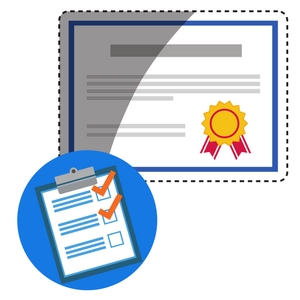
The specific criteria that allow veterans to qualify for a VA loan are relatively easy to meet. You must serve in some branch of the armed forces for a minimum period of time and receive other than dishonorable discharge.
In general, the service time requirements for the various branches are listed below:
Armed Forces during peacetime: 180 days of continuous active duty status unless discharged for a service-related disability
Armed Forces during wartime: 90 days of continuous active duty status unless discharged for a service-related disability
National Guard or Selected Reserve: Six creditable years unless discharged for a service-related disability
There are more specific requirements regarding the time periods during which you may have served as well. To check to see if you qualify, you can take a look at the specific requirements from the VA here.
Can Spouses Qualify for a VA Loan?
Under some circumstances, the spouse of a service member may be eligible to receive financing through the VA loan program as well. This allows them to take advantage of all the many benefits of a VA loan, even if they did not serve in the armed forces themselves. The specific criteria for a spouse hoping to qualify for a VA loan require that you be:
The widow or widower of a service member who died while in service or from a service-connected disability
The spouse of a service member who is missing in action or a prisoner of war
The recipient of the Dependency and Indemnity Compensation benefits if your spouse’s death was not service-related
You must not be remarried unless you are over the age of 57 and got married after December 16, 2003.
How Do I Qualify?
If you want to qualify for all of the advantages of a VA loan, you need to meet the service requirements listed above. These will help you to obtain your Certificate of Eligibility (COE) that allows you to receive some of the entitlement funds from the federal government.
Applying for your Certificate of Eligibility can take just minutes if you fill out the required information online or weeks if you prefer to send it in by mail.
From here, you will also need to select a property that meets the guidelines and minimum property standards for a VA loan.
You can purchase many different types of properties with a VA loan, including single-family homes, manufactured homes, and condos in a VA-approved project.
You may even be able to build a new home or purchase and upgrade a new home.
No matter what property you select, they must all meet the minimum standards during the appraisal process.
These regulations are put in place to ensure that a potential home is both safe and sanitary for a veteran to live in. An appraiser must inspect the property to determine if any major issues exist, such as issues with heating, electrical, sewage, or running water.
You must also have a good income and a low debt-to-income ratio that demonstrates affordability for the property. The specific requirements for these items will be determined by your unique lender.
Frequently Asked Questions About VA Loan Benefits

Can you add closing costs to a VA loan?
Closing costs may not be added to the principal balance of a VA home loan, but the funding fee could be. Homebuyers who intend to use the VA home loan to fund their purchase may be able to request that the seller cover the closing costs or receive credits from their lender toward these fees. They typically average between three and five percent of the home’s value (not including the funding fee) and must be paid upfront.
There are some fees related to closing that are “non-allowable,” meaning that veterans cannot be charged for them. These include:
- Attorney fees charged by the lender
- Broker commissions or fees
- Real estate agent commissions
- Appraisal requested by the lender or seller (anyone other than the buyer)
- Fees for flood zone determination by the lender or appraiser
For more information on closing costs, you can see the expected costs on this VA brochure here.
What is the interest rate on a VA home loan today?
There are no set interest rates for a VA home loan. Instead, these rates are determined based on individual factors such as your credit score, income, overall debt, and other economic indicators. Each lender will set their own rates that may fluctuate on a daily basis.
Be sure to check with your lender to see what rates you may qualify for when it comes to your VA home loan today.
Can I reuse my VA home loan?
Yes, you can reuse your VA home loan. You will need to pay back the entitlement you borrowed from the government before you can move forward with another VA loan. This can be done when the mortgage is finished or is paid off through the sale of the house.
Some veterans may have money left over on the eligibility that would allow them to qualify to use the VA home loan again sooner.
VA Loan Benefits Conclusion
Prospective home buyers should really be aware of all the benefits that come along with the VA loan program. You could easily qualify to waive your down payment, avoid unnecessary monthly fees, and even rid yourself of your mortgage ahead of schedule with no penalty.
All of the inherent benefits of this program combine to put you in a financially stable status that allows you to receive the best possible deal on a home.
Keep in mind that you can use this benefit multiple times over the years. Even if you receive a PCS or just desire a change of scenery, you don’t have to sacrifice the benefits of this loan program.
Be sure to talk with your lender today about whether you meet the qualifications for this program and can receive all of the benefits associated with it.
by Mike Plambeck
Buying a HUD home can be a dream come true for many prospective buyers who want to find a fantastic bargain on their next house. These properties are often sold at significant discounts because they are the product of a foreclosure.
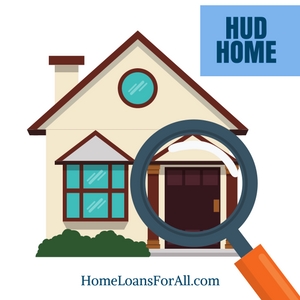
While this doesn’t necessarily mean that the homes are perfect inside and out, it does offer you the potential to save significant amounts of money from the appraised value of the home.
If saving money on your next property purchase is appealing to you, you may want to find out more about how you can own your very own HUD home.
What is a HUD home and who qualifies? This is a key question that many consumers will ask before they start the HUD home buying process. You should know the basics of this program before deciding to pursue it further.
Get Help Today – Pre Qualify for Buying a Hud Home, Click Here.
Before Buying HUD Homes: What Are They?
HUD homes come under the possession of the Department of Housing and Urban Development because of a foreclosure. Typically, these homes had an FHA (Federal Housing Administration) mortgage that moved into default before the lender took possession of the property.
The backing of the federal government comes into play on these homes, so HUD attempts to sell them to recoup the cost of the property for themselves and the lender.
What are the benefits of HUD homes?
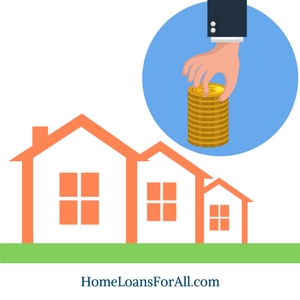
By purchasing a HUD home, you can take advantage of the numerous perks that come along with these properties. The most obvious benefit of these properties is their low price. Homebuyers can save thousands of dollars when they purchase a foreclosed property, a savings that can really add up over the duration of a loan.
The low price of the property also means that you will have a lower down payment when you are buying a HUD home. Many properties still qualify for the FHA mortgage which means you might only be required to bring a 3.5 percent down payment to closing.
Given that a conventional mortgage typically requires a twenty percent down payment, this automatically means that you can make homeownership a more immediate reality.
HUD is even willing to contribute up to five percent of the closing costs. The process of buying a HUD home is paved with savings.
Keep in mind that some of these properties already have an FHA appraisal, allowing the purchase process to move much faster. Buyers who have a strict deadline for when they need to be in a new house may want to explore this option further.
All HUD homes are required to close within thirty days of accepting the offer unless an extension is given.
Who are HUD homes for?
HUD homes are for anyone who wants to take advantage of the benefits listed above. If you can afford to either pay cash for your new property or can obtain financing through a private lender, you can purchase one of these properties.
You must also consider whether you are up for potentially extensive remodeling. There is a possibility that not all of these foreclosed homes will be in “move-in” ready condition. Some haven’t been maintained in a very long time, so you may be faced with the need for immediate and widespread repairs on a number of essential systems.
Who Can Buy a HUD Home?
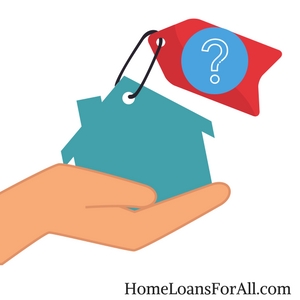
Anyone who has the money or can secure the financing to pay for the property may purchase a HUD home. These properties are usually eligible for a number of mortgage programs, including a conventional mortgage as well as an FHA loan.
The specific credit requirements and other eligibility criteria will vary based on the lender you select. None of the financing for the HUD home buying process is available from the federal government.
While they may offer to back some of their programs like the FHA mortgage, the rest of the financing is strictly offered through a collection of approved private lenders who choose to work with them.
As a result, the credit requirements will vary based on the type of financing you select and your lender.
FHA loans typically require a credit score no lower than 500 but be aware that you may face a higher down payment with scores in the 500 to 579 range.
Consumers with these lower scores will face a ten percent down payment compared to the 3.5 percent down payment for consumers with a credit score of 580 or higher.
The Process of Buying a HUD Home
Are convinced that you’re ready to learn how to buy a HUD home? The entire process is relatively simple, but it can help to know what to expect in advance. In the coming sections, we will walk you through what to anticipate when you are attempting to purchase your very own HUD home.
Where can I find a HUD home?
All of the eligible properties listed for sale are located on the government website, HUDHomestore.com.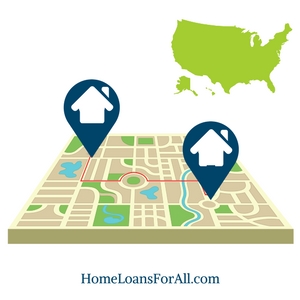 This page allows you to search for properties in your area by state, city, county, and even zip code. The HUD Homestore is a listing site to assist eligible buyers with finding the property that will work perfectly for their family.
This page allows you to search for properties in your area by state, city, county, and even zip code. The HUD Homestore is a listing site to assist eligible buyers with finding the property that will work perfectly for their family.
You don’t have to have a special login or credentials to view the properties for sale through the Homestore. The general public can easily view the available listings, as can mortgage brokers, government organizations, and real estate agents who might be attempting to help their clients.
Most of the properties listed here will be single-family residences.
You can find more information on the HUD home buying process and about homeownership in general through this page. There is absolutely no risk just for clicking around, so be sure to do a little research on what might be available in your local area before you commit to buying a HUD home.
How do I apply for buying HUD home?
The application process for buying a HUD home is a little different than it is for more conventional and straightforward home purchases. The first thing you should do is talk to your lender about what types of loans you might qualify for.
Having a pre-approval in hand can give you a greater degree of confidence and certainty before you start viewing homes with a real estate agent.
Keep in mind that some of the properties on the HUD Homestore are only available to owner-occupants (those who own and live in the home as their primary residence) during a two-week exclusive listing period.
After this period passes, properties will then become available to investors, government agencies, and other buyers who might be interested.
Whether you are an investor or an owner-occupant, you will need a HUD-approved agent who can submit a bid for the desired property on your behalf. This professional is required if you would like to purchase a HUD home because owners are not permitted to submit a bid without their assistance.
Buyers are free to submit a bid for whatever amount you choose, whether it’s higher or lower than the current asking price.
Bidding on a HUD home doesn’t mean that you will automatically win the house. HUD reserves the right to accept any offer they like or to refuse all offers during a given time period.
What are the financing options?
In general, you can purchase a HUD home with any qualifying mortgage. Many buyers might choose to consider conventional financing that features a twenty percent down payment with no private mortgage insurance and relatively low interest rates. However, there are other options available for those who can’t scrape together enough savings for such a generous down payment.
FHA Financing
The FHA financing program is one of the most popular choices for those interested in buying a HUD home. This financing program offers a loan that is partially backed by the federal government, allowing lenders to have a little more security when it comes to lending to riskier applicants.
Every lender will have the opportunity to approve or deny an applicant based on their own standards, but here are the general requirements for an FHA mortgage:
- Credit score of 500 or above
- Down payment of ten percent for those with a credit score between 500 and 579
- Down payment of 3.5 percent for those with a credit score of 580 or higher
- Debt-to-income ratio of 43 percent or less (including the new mortgage and interest payments)
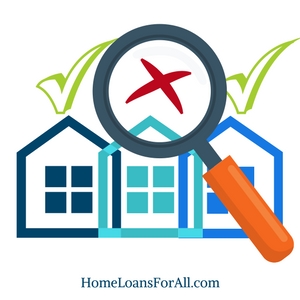
In exchange for meeting these criteria, borrowers tend to receive lower interest rates compared to traditional mortgage options. Each lender will have unique interest rates based on economic indicators, as well as your personal credit details and income information.
The homes that are eligible for an FHA mortgage must meet the minimum property requirements for safety and sanitation. This means that an objective third-party appraiser does not find any glaring issues with the heating, electricity, water, plumbing, roof, or foundation of the home. An appraisal is not the same thing as a thorough inspection, which is recommended with the purchase of a HUD home.
However, these appraisals that are looking for basic safety and sanitation may disqualify a HUD home that is in complete disrepair.
The major disadvantage to using an FHA mortgage is that you will be required to pay private mortgage insurance (sometimes seen as mortgage insurance premiums) for the duration of your loan. Conventional financing typically waives this requirement once you have built up at least twenty percent equity in the property.
FHA 203K Loans
Does the idea of purchasing a major fixer-upper fill you with excitement? You may not be frightened by the anticipation of some serious work on your new home, making a HUD home the perfect property for you.
Fixer-uppers that fall into this category probably won’t qualify for an FHA mortgage, but you may still be able to receive the 203K loan. This financing option allows you to gain extra funds for renovating the property until it meets the safety and sanitation standards.
Most homeowners who have to move through the construction process are required to take out a second loan known as a construction loan. They use the draws from this funding to cover the cost of the repairs during the renovation.
When the property is finished, they refinance the construction loan into a new mortgage. Homeowners are frequently required to pay for two closings in addition to the high interest rates on the construction loan.
The FHA 203K loan offers a better way to restore a property back to a habitable condition. You can have one low and fixed interest rate to cover the cost of the home and the renovations. Only one closing is necessary and it can be much more affordable for homeowners as a result.
Do I need a home inspection?
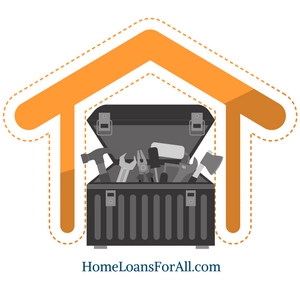
One of the scariest parts of buying a HUD home is the lack of guarantee regarding the condition of the property. HUD sells all of the homes as-is with no warranty or guarantee of any kind. They make no effort to fix up the properties or restore them to livable condition before the sale occurs. The new buyer will be responsible for the entire renovation including the expense.
It is highly recommended that you enter the HUD home buying process with your eyes wide open. The best way to do this is to enlist the help of a professional and well-qualified home inspector.
You should have the inspection done prior to submitting an offer so that you know just what areas of the home will need repair and if any of them are extremely expensive.
The appraisal associated with FHA loans is not a substitute for a thorough home inspection. Appraisals are looking only at the basic safety of the home, but that doesn’t mean that nothing is immediately wrong.
Your inspector may point out areas that are cause for concern right now or those that could be lurking on the horizon in the coming months. They will survey all of the important areas of the home looking for these potential pitfalls.
Before you make an offer, you should always have an inspection done to ensure that you can handle the renovation load and the cost of the remodel. An untrained eye won’t be able to spot these major issues during a simple walkthrough.
Your financial future could be at stake if you purchase a home without an inspection. A great inspection could prevent you from purchasing a home that is destined to be a money pit.
Read more about HUD Inspections here.
What should I know about closing?
Many buyers love the idea of buying a HUD home because it offers them a significant savings on the closing costs associated with a new purchase. HUD is willing to contribute up to five percent of the home’s value to cover the closing costs. Furthermore, you won’t be required to pay the real estate professional’s commission fees either.
Closing costs can often add up to equal three to five percent of a home’s overall value, so this savings should be noted as significant.
The official closing should be scheduled within thirty days of the offer being accepted. This is only able to be extended with written permission from HUD, an exception that is usually only issued if your lender is still attempting to process your loan application and paperwork.
The entire HUD home buying process can move very quickly, so you should be immediately prepared to dive right in once you make an offer on a home.
Frequently Asked Questions
How do investors buy HUD homes?
Investors may bid on HUD homes after the exclusive listing period for owner-occupant priority. This may not be available for the first two weeks that a property is listed on the HUD Homestore website.
How long do you have to occupy a HUD home?
Individuals who purchase the home as an owner-occupant must live in the home for a minimum of twelve months. If you purchased a HUD home under their Good Neighbor Next Door incentive, you agree to live in the property for a minimum of three years.
How long does it take to get approved for a HUD home?
You will be notified of whether your offer was accepted on a particular property within 48 hours of the bid deadline.
Can you buy a HUD home to flip?
Yes, you can flip a HUD home if you purchase the property as an investor instead of as an owner-occupant. You will have to wait until after the exclusive listing that prioritizes owner-occupants in order to bid for this purpose.
How do you apply for a HUD home?
HUD does not issue any financing for the properties listed through the HUD Homestore. You must apply for financing with a private lender. A professional and HUD-approved real estate professional can assist you with placing a bid on a potential property.
Why are HUD homes so cheap to buy?
HUD homes are the result of an FHA mortgage foreclosure. They sold at rock bottom prices to help the federal government and the lender to recoup some of their losses quickly.
Does HUD offer other programs?
HUD does offer incentive programs to sell these homes quickly. There are three major programs that most home buyers will want to be aware of before they purchase a HUD home:
Good Neighbor Next Door: Offers a fifty percent discount for law enforcement officers, teachers, firefighters, and emergency medical technicians who agree to live in the property for three years
Non-Profit Program: Lists properties at a thirty percent discount to help nonprofit agencies provide affordable housing to low- and moderate-income families
HUD Dollar Homes: Offers available properties to the local government for one dollar each to help facilitate assistance for low-income families who need housing
After buying a HUD Home, Can I rent it?
Yes, HUD homes can be rented if you purchase them as an investor instead of as an owner-occupant.
Can You Negotiate the Price when Buying a HUD Home?
Yes, you can negotiate the price of a HUD home.
Can I buy a HUD home with bad credit?
Yes, you may purchase a HUD home with bad credit if you are able to secure financing with a lender.
Can you buy a HUD home with no money down?
You may be able to purchase a HUD home with a VA loan or a USDA loan that does not require a down payment.
How do I start bidding on a HUD home that I want to buy?
You will need to work with a HUD-approved real estate professional to submit a bid package on any property.
How do I go about buying a HUD home?
You must first obtain financing from your lender to ensure that you qualify to purchase a HUD home. Then, you can work with a real estate agent to help you submit bids and schedule walkthroughs on properties listed for sale at the HUD Homestore.
Who qualifies to buy a HUD home?
Anyone who can obtain financing from a lender or who has the money to pay for the house can qualify for a HUD home.
Buying a HUD Home Wrap Up
Buying a HUD home is guaranteed to save you a lot of money on the upfront cost of a home purchase. You should be prepared for the possibility of extensive renovations and a quick closing process when you consider whether bidding on a HUD home is going to be the right choice for you and your family.
Take some time to search through the HUD Homestore and see if any properties catch your attention. From there, it’s best to contact your lender for pre-approval and more details on the type of financing you might qualify for. Your dreams of home ownership could become a reality with one of these eligible HUD homes.




 Everyone dreams of owning a home, but if you have bad credit, that dream can sometimes feel like a nightmare. It’s easy to get discouraged, but you shouldn’t, because there are plenty of ways to get a home loan in Illinois even with bad credit.
Everyone dreams of owning a home, but if you have bad credit, that dream can sometimes feel like a nightmare. It’s easy to get discouraged, but you shouldn’t, because there are plenty of ways to get a home loan in Illinois even with bad credit. The Illinois Housing Development Authority is a self-supporting state agency whose board members are appointed by the Governor. It finances affordable housing throughout the state of Illinois in order to help low and moderate-income people afford mortgages.
The Illinois Housing Development Authority is a self-supporting state agency whose board members are appointed by the Governor. It finances affordable housing throughout the state of Illinois in order to help low and moderate-income people afford mortgages. If you’re not ready or unable to secure a home at this time, either. Maybe, your credit is too bad or because you’re otherwise ineligible for any of the programs above, you might consider a rent-to-own situation.
If you’re not ready or unable to secure a home at this time, either. Maybe, your credit is too bad or because you’re otherwise ineligible for any of the programs above, you might consider a rent-to-own situation. First-time homebuyers in Illinois usually prefer either the IHDA 1stHomeIllinois loan option or the FHA loan. Both can and will help you secure your first loan even if you have bad credit. If your credit is 580, your down payment on an FHA loan will only be 3.5 % in most cases.
First-time homebuyers in Illinois usually prefer either the IHDA 1stHomeIllinois loan option or the FHA loan. Both can and will help you secure your first loan even if you have bad credit. If your credit is 580, your down payment on an FHA loan will only be 3.5 % in most cases. There are many different kinds of assistance available to the prospective home buyer with bad credit in Illinois.
There are many different kinds of assistance available to the prospective home buyer with bad credit in Illinois. Fixing your credit score takes a lot of time and effort, especially if you’ve had to foreclose on a house or file for bankruptcy in the past. The first thing you have to do to fix your score is to pay every bill on time every month. It sounds terrifying but there is nothing supernatural in that. You can do this!
Fixing your credit score takes a lot of time and effort, especially if you’ve had to foreclose on a house or file for bankruptcy in the past. The first thing you have to do to fix your score is to pay every bill on time every month. It sounds terrifying but there is nothing supernatural in that. You can do this!

 Veterans and service members who are looking to purchase a home in 2018 will be excited to learn about all of the great VA loan benefits.
Veterans and service members who are looking to purchase a home in 2018 will be excited to learn about all of the great VA loan benefits. 
 This perk is one of the most heavily advertised features of a VA loan program. Lenders are able to waive the typical down payment on a home due to the backing of the federal government.
This perk is one of the most heavily advertised features of a VA loan program. Lenders are able to waive the typical down payment on a home due to the backing of the federal government.  Finding the exact interest rates for a VA loan can be difficult. It should be noted that the government doesn’t actually set specific interest rates for this program.
Finding the exact interest rates for a VA loan can be difficult. It should be noted that the government doesn’t actually set specific interest rates for this program. 





 This page allows you to search for properties in your area by state, city, county, and even zip code. The
This page allows you to search for properties in your area by state, city, county, and even zip code. The 










